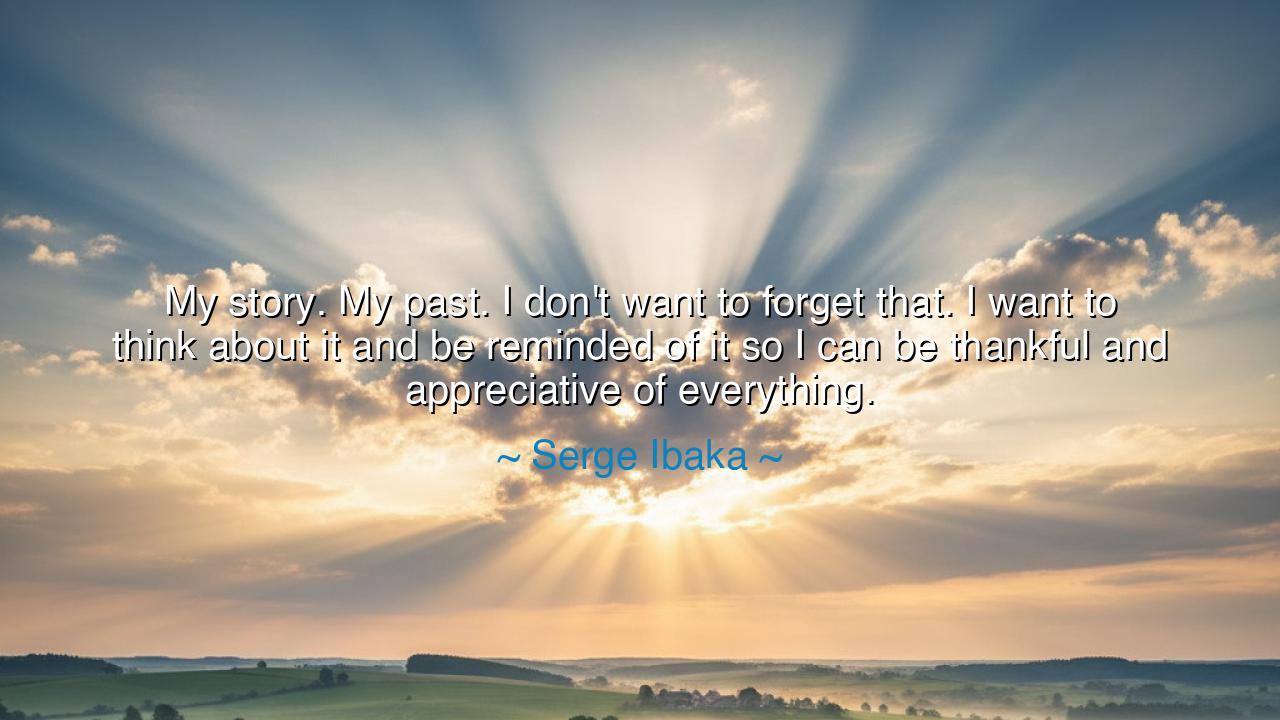
My story. My past. I don't want to forget that. I want to think
My story. My past. I don't want to forget that. I want to think about it and be reminded of it so I can be thankful and appreciative of everything.






Hear now the words of Serge Ibaka, spoken with the strength of one who has walked through hardship and come forth tempered like iron: “My story. My past. I don’t want to forget that. I want to think about it and be reminded of it so I can be thankful and appreciative of everything.” In this simple confession lies a wisdom as old as time—that memory is not a burden but a sacred teacher, and that to forget one’s roots is to sever the very source of strength.
The ancients knew well the power of remembering. The Greeks sang of Odysseus, who carried the weight of his past—his trials, his wanderings, his wounds—as the very fuel that drove him home. Without memory of Ithaca, his journey would have been meaningless. Serge Ibaka, who rose from the soil of Congo through struggle, loss, and exile, speaks in the same spirit. His story is not an ornament to be polished, but a fire to be preserved, for in its flames he sees why his victories matter.
There is great heroism in this remembrance. Many, when they escape poverty or sorrow, turn their backs on it, ashamed to be marked by suffering. But Ibaka declares, “I don’t want to forget.” He embraces the scars of his past as treasures, for they remind him of the distance he has traveled. Like the Romans who bore the laurel not to erase their battles but to honor them, he teaches us that true greatness comes not from erasing pain but from transfiguring it into gratitude.
Consider the tale of Frederick Douglass, born into slavery yet rising to become one of the most powerful voices for freedom in the nineteenth century. He did not hide his past; he proclaimed it. His speeches, filled with the memory of chains, struck the conscience of nations. By remembering, he gave power to his cause, and by refusing to forget, he transformed his wounds into weapons of justice. In the same way, Ibaka shows us that remembrance is the soil in which thankfulness grows.
For what is thankfulness, if not the recognition that the present is brighter because of the shadows of the past? To be appreciative of life is to stand in the sunlight and recall the storms one has endured. Without memory, blessings become ordinary; with memory, even the smallest gift becomes radiant. Ibaka’s words reveal this paradox: that to dwell upon struggle is not despair but a pathway to joy, for it sharpens the sweetness of every triumph.
The lesson is clear: do not despise your story, however difficult, and do not erase your past, however painful. Instead, hold it before you as a mirror, a compass, and a fire. Let it remind you of who you were, so that you may remain humble in who you are. Let it remind you of what you endured, so that you may remain thankful for every breath of peace and every moment of abundance.
Practical wisdom calls you to action: each day, remember something from your past that shaped you. Write it down, speak it aloud, tell it to your children, or keep it close in silence. Let memory guide your gratitude. And when success or comfort tempts you to forget, return to your roots and honor them. For in remembering, you preserve the sacred link between struggle and blessing, pain and joy, darkness and light.
Thus, from Ibaka’s declaration, let us carry this teaching: your story is your strength, your past is your teacher, your gratitude is your crown. Do not turn away from them, for they are the pillars of your life. The one who remembers walks wisely; the one who forgets walks blind. Therefore, guard your story, embrace your past, and live each day thankful and appreciative of everything.






AAdministratorAdministrator
Welcome, honored guests. Please leave a comment, we will respond soon